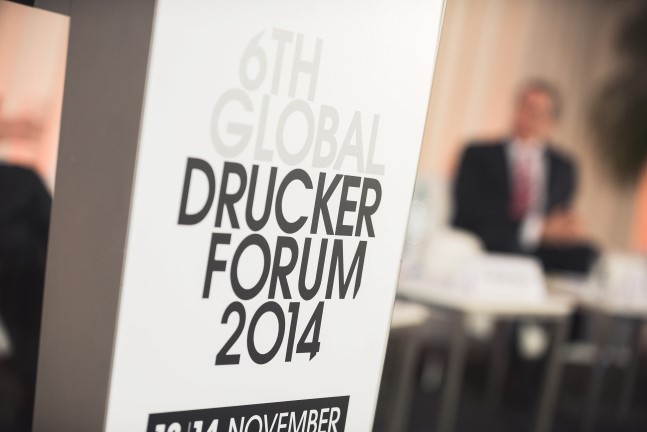A group of like-minded people will be required to make change a reality, but a certain amount of difference is needed to fuel innovation. Not long after she started working at Sitra, Katri Vataja got to participate in the Global Drucker Forum 2014 conference in Vienna.
On 13 and 14 November 2014, the sixth Global Drucker Forum was held in Vienna, Austria. This year’s theme was: The Great Transformation – Managing Our Way to Prosperity. The conference attracted 400 participants, while another 2,000 watched the live stream of the event. One viewer justified their participation by quoting Californian surfers: “it’s very important to get ahead of the wave”. This also describes Sitra as a future-oriented organisation. Sitra was one of the sponsors of the Global Drucker Forum 2014.
The conference programme was exciting, packed full of inspirational presentations and brilliant speakers. The main focus of the forum was the great transformation, which was examined in the light of global trends and in relation to factors such as economic mechanisms, Europe’s competitiveness and future prospects, digitisation, changes in the labour market and working life, and the role and reshaping of management. The speakers also touched upon the intellectual heritage of Peter Drucker, the thinker after whom the event was named, in presentations that reflected on the current situation and their own ideas.
To succeed, we need innovations that generate new markets, jobs and prosperity, espoused Clay Christensen in his speech. Christensen is famous for his ideas on innovative thinking. In-depth discussions on the state and functionality of the economy identified the root of the problem as short-termist investment, the business objective of maximising shareholder value and analyses that favour this objective. Martin Wolf, chief economics commentator at the Financial Times, said that the logic of capitalism had turned in upon itself. It favours investment in efficiency innovations and performance-improving innovations, because they promise a quick pay-off. At it stands, current share values cannot be used to measure the true value of an enterprise. In the spirit of Drucker, we were reminded that the main business objective of enterprises should be to bring added value to their customers.
Roger Martin also considered it problematic that the greatest rewards go to those who trade based on value and not to those who actually create it. Gary Hamel‘s electrifying speech made it crystal clear to listeners that bureaucracy, formal hierarchies and a control-centric approach to management are the worst enemies of change and are obstacles to leveraging the potential of enterprises.
Dov Seidman emphasised the importance of the “how” in the quest for success and paying attention to the way our values and commitment to humanity are realised in our actions. This is not about prioritising soft skills over hard results. The enterprises that succeed best will be those that focus on the human dimension of work and on the human economy.
“Doing the right thing is more important than doing the thing right.” Peter Drucker
There was a call for winds of change to blow through existing leadership and innovation practices. Innovation and radical, new types of leadership are perhaps now needed more than ever. Innovation blooms in a working culture in which there is a high level of trust, work is viewed as meaningful and employees are committed to and excited by an organisation’s vision. Agendas and time management rather than rhetoric indicate how genuine a commitment to innovation is.
In a creative economy and within flat organisations, each person acts as a manager and innovator. We therefore need comprehensive and mainstreamed innovation expertise and role models who “walk the talk”, thus lowering the risk involved in putting oneself on the line. With their success stories, young executives Marc Merrill (Riot Games) and Georg Polzer (Teralytics) have provided a fresh perspective on a new working culture. A group of like-minded people will be required to make change a reality, but a certain amount of difference is needed to fuel innovation. It should be possible to challenge assumptions and turn the whole issue on its head.
It felt like the forum reached a consensus that radical change is necessary and that the future is now. Each one of us is a leader and therefore responsible for doing the next right thing. Are we up to the task?
A lively discussion concerning the forum was held on Twitter #GPDF2014; a summary is available here. The presentations will be posted here by the end of November.






Recommended